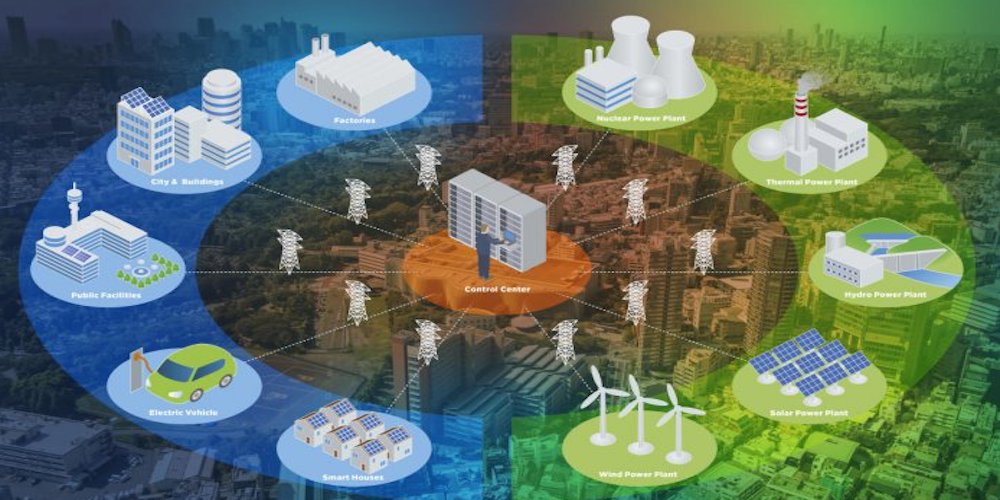National Smart Grid Mission

India’s power sector is moving further along the path of meeting and inspiring the aspirations of our rapidly developing nation. Universal access to affordable power in a sustainable manner has been the guiding principle for the Power sector. The sector is fully geared to address the challenges related to climate change through energy transition initiatives which aligns itself with the commitments made by the nation on the global stage. Therefore, India has twin goals, to ensure 24×7 adequate and reliable energy access and simultaneously, accelerate clean energy transition by reducing the country’s reliance on fossil based energy and shifting to cleaner and renewable energy sources.
In this task, the National Smart Grid Mission (NSGM) has been an important component. NSGM was established by t was established by the Government of India in 2015 to plan and monitor the implementation of policies and programmes related to smart grid activities in India. NSGM also envisages capacity-building initiatives for the Distribution Sector personnel in the field of smart grids.
Why NSGM?
Smart Grid is an electrical grid with automation, communication & IT systems that can:
• Monitor, measure, and control power flows in real-time
• Identify losses and take appropriate actions to manage the losses.
• Make electrical grids amenable to renewable energy inputs through distributed generation.
During the implementation of Smart Grid pilot projects in the state utilities, it was felt that smart grid efforts required urgent concerted focus. For this, it was necessary to create a comprehensive institutional arrangement capable of dedicating the manpower, resources, and organizational attention needed to take it forward.
NSGM has been formed with its own dedicated team, resources, authority, and functional & financial autonomy to plan and monitor the implementation of the policies and programs related to Smart Grids in the country.
NSGM Structure
NSGM is housed under the Ministry of Power. Other concerned Ministries like the Ministry of New and Renewable Energy and Ministry of Heavy Industries are also associated with the mission.
NSGM functions with a three-tier hierarchical structure as follows:
• 1st Level – Governing Council6 , headed by the Union Minister of Power.
• 2nd Level – Empowered Committee , headed by Secretary (Power).
• 3rd Level – NSGM Project Management Unit.
So far, the following projects have been sanctioned under the National Smart Grid Mission:
• Sub Division 5 under Chandigarh Electricity Department (CED), Chandigarh
• Complete City excluding Sub Division 5 under CED Chandigarh
• Six Towns under Jaipur Vidyut Vitran Nigam Limited (JVVNL), Rajasthan
• Ranchi City under Jharkhand Bijli Vitran Nigam Limited (JBVNL), Jharkhand Status of Smart Grid Projects under NSGM10 (as of May 2022)
Smart Grid Knowledge Centre
The Smart Grid Knowledge Centre (SGKC) is a state-of-the-art platform for the demonstration and outreach of smart grid technologies. Established by the POWERGRID, with support from the Ministry of Power and the NSGM, the SGKC showcases smart grid technologies through demonstrations and provides training and capacity-building support to power distribution companies. Now, SGKC is being developed as one of the leading Centres of Excellence (CoE) under the guidance of the Ministry of Power to foster partnerships, innovation and entrepreneurship in Smart Grid technologies and create capacities in the power sector.
Smart Meter (SM) Statistics Dashboards
NSGM Project Management Unit (NPMU) has developed multiple dashboards on Smart Meters deployment statistics and hosted the same on the NSGM website. The dashboards are updated on a regular basis with inputs from multiple stakeholders viz. utilities, implementation agencies, and manufacturers.
Future of NSGM in India
It is important to note that smart grids are a dynamic and evolving concept due to constant technological innovations. Therefore, the objectives, structure and functioning of NSGM is sketched so as to allow sufficient freedom and flexibility of operations without needing to refer the matter to different Ministries / Agencies frequently.



